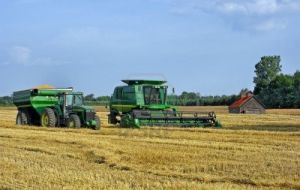MercoPress. South Atlantic News Agency
Xmas rainstorms and soggy soil delaying soy and corn planting in Argentina
 Wheat harvesting has also been delayed and the crop estimate was lowered 5% by the government
Wheat harvesting has also been delayed and the crop estimate was lowered 5% by the government Christmas rainstorms across Argentina further delayed soy and corn planting, keeping markets guessing about whether the grains powerhouse can produce enough this season to help bring high-flying global food prices down to earth.
Argentina is the world's No. 2 corn exporter after the United States and its No. 1 soy-oil and soy-meal supplier. But sowing in the central Pampas farm belt lags last season's tempo by about 20 percentage points, said Tomas Parenti, an agronomist with the Rosario grains exchange.
Up to 100 millimetres of rain fell late on Monday and early Tuesday (Christmas Eve and Christmas Day), forcing some growers once again to park their seeding machines lest they sink in the mud.
Any more harsh rains at this point -following an unusual August-October wet spell that turned prime Argentine farmland into soggy soil, will add to the problem, Parenti said.
“There is excessive moisture in low-lying areas throughout the central farm belt,” Parenti said, referring to an area including parts of Buenos Aires, Santa Fe and Cordoba provinces.
“Fields located in the same area but at higher elevation are in good shape. We're not expecting a lot of rain over the week ahead but if we get any surprises, anything over 40 or 50 millimetres, it will worsen the problem,” he added.
Argentina's main grains port of Rosario situated along the Parana River and offering access to the shipping lanes of the South Atlantic, has received almost twice its normal rainfall this year.
Soggy conditions on the Pampas are bad news for consumer nations looking to Argentina for the supply needed to soften food prices squeezed higher this year by dry crop weather in breadbaskets Russia, the United States and Australia. Benchmark Chicago soy futures are up 20% over the last 12 months, with corn up 9% and wheat 22%.
Global food markets face further volatility in 2013 as stocks and supply of key cereals have tightened, the United Nations food agency said this month.
The rains have also slowed 2012/13 wheat harvesting. The Argentine Agriculture Ministry cut its estimate for 2012/13 wheat production by 5% to 10.5 million tons, which is still higher than leading private forecasts but reflects damage caused by the wet weather.
The Buenos Aires Grains Exchange expects farmers to harvest 9.8 million tons of wheat, while the Rosario exchange sees the crop coming in at 9.5 million tons. Rosario sees 53 million tons of soybeans produced this season and 24 million tons of corn. The Buenos Aires exchange has not yet issued 2012/13 corn and soy projections.




Top Comments
Disclaimer & comment rules-

-

-

Read all commentsGood to see a bit of quality JohnDeere Agricultural machinery there.
Dec 27th, 2012 - 09:13 am 020% less crops planted...hmm
Dec 27th, 2012 - 11:45 am 0It has got to be hard to run an economy that is 100% dependent on good weather.
Bahahahaha
Checking out argieland's weather forecasts suggest that there will be around 100mm of rain in January. Bit too much methinks. Never mind. Does that mean even less crops?
Dec 27th, 2012 - 01:46 pm 0Commenting for this story is now closed.
If you have a Facebook account, become a fan and comment on our Facebook Page!